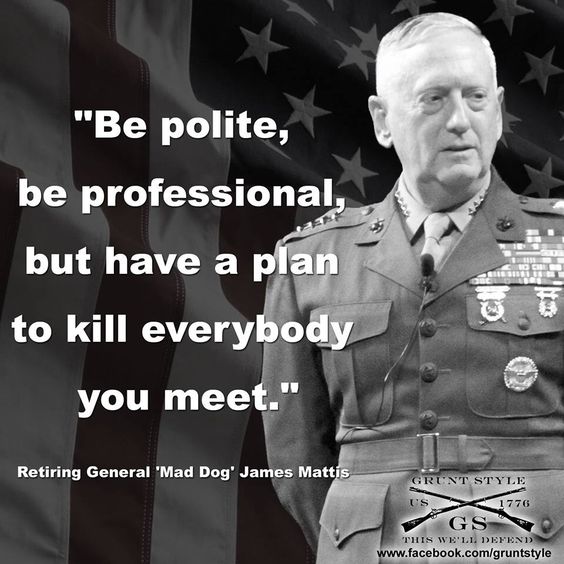
The Mattis Philosophy: Lessons Beyond the Battlefield
The Mattis Philosophy: Lessons Beyond the Battlefield
Be Polite
As a veteran, I've sometimes been a bit rough around the edges. Though I'm an introvert at heart, I don't shy away from matters important to me, and I speak directly when difficult conversations are necessary. That said, I possess an inner passion that can be challenging to contain, and I admit I can be a hothead at times.
Throughout my journey in both software engineering and management, I've discovered that earning respect is far more valuable than being feared or even being liked. Trying to please everyone is a losing battle—it's simply not how the world works. No matter how hard you try, some people won't like you, and that's okay. You don't need to socialize with everyone, but being polite and respectful is non-negotiable. It circles back to the golden rule: do unto others as you would have them do unto you.
Be Professional
Certain aspects of professionalism come naturally to me. Being late causes me actual discomfort—it's something I struggle to do. The principle that "if you aren't 10 minutes early, you're late" has been deeply ingrained in me. I used to join all Webex meetings 10 minutes before start time, only to realize this isn't standard practice in the corporate world, where people often join a few minutes late, apologizing that their previous meeting ran over.
While my language and demeanor aren't always perfect, I consistently strive to maintain professionalism. Whether representing our nation in the United States Army or developing software integrations, I live by the Boy Scout rule: leave it better than you found it.
Have a Plan to Kill Everyone You Meet
This principle sounds dark—I acknowledge that—but it shouldn't always be taken literally. It's a quote from General James Mattis (retired), so there are certainly combat implications. Mattis, who served as Commander of United States Central Command from 2010 to 2013 and later as Secretary of Defense, earned the nickname "Mad Dog" for his blunt speaking style and aggressive approach to warfare.
For those of us in civilian life, this aspect of the philosophy is about preparedness and strategic thinking. It means understanding potential risks in any situation and having contingency plans ready. In software development, it translates to anticipating edge cases and system failures before they occur. In management, it means knowing how to respond when projects veer off course or conflicts arise.
This principle has a powerful application for individual contributors in any organization: Don't ask your manager what you should do—tell them what you plan to do. This approach demonstrates initiative, preparation, and strategic thinking. Rather than waiting for direction, develop a plan and present it. This shift from a reactive mindset to a proactive one is transformative. It shows you've thought through the problem and possible solutions, which builds trust with leadership and accelerates your professional growth. Your manager can then provide feedback, add context you might be missing, or approve your direction—but you've already demonstrated your capability to think independently and take ownership.
During my 2011 deployment overseas, when Mattis was the CENTCOM Commander, I witnessed this philosophy in action. As a 25 series specialist within a Patriot battalion, my role evolved from troubleshooting in S6 and building computers from spare parts (acquired from our partnered Air Force Squadron) to eventually joining ICC where I was responsible for maintaining the Communication Plan. Redundancy was paramount—having just one communication shot wasn't sufficient; a redundant backup was always necessary. This experience has become a metaphor for me about always having a backup plan.
The Balance of Strength and Wisdom
What makes Mattis's philosophy so powerful is the balance it strikes:
- Be polite—showing respect and humanity
- Be professional—maintaining standards and integrity
- Have a plan—staying prepared and strategic, taking initiative rather than waiting for instructions
These principles create a framework for approaching life's challenges with both strength and wisdom. They apply universally, whether you're in a combat zone, a corporate boardroom, or simply navigating everyday interactions.
Though I've never met General Mattis face-to-face, his principles have profoundly shaped my approach to life and work. They remind me that true leadership isn't about intimidation or popularity—it's about earning respect through consistent behavior, upholding professional standards, and always staying one step ahead.
As I continue my journey from military service to the tech world, I carry these lessons with me. They've helped me navigate difficult transitions, build stronger teams, and face uncertainty with confidence. When I moved into management, I found myself especially appreciating team members who embodied the "have a plan" principle—those who came to me not with questions about what to do, but with their own well-considered plans of action.
This approach has proven invaluable on both sides of the management relationship. As an individual contributor, it accelerated my growth and earned trust faster than any other professional habit. As a leader, it allowed me to focus on removing obstacles rather than directing traffic.
Perhaps that's the greatest value of Mattis's words—they provide guidance not just for warfare, but for professional relationships, leadership, and life itself.